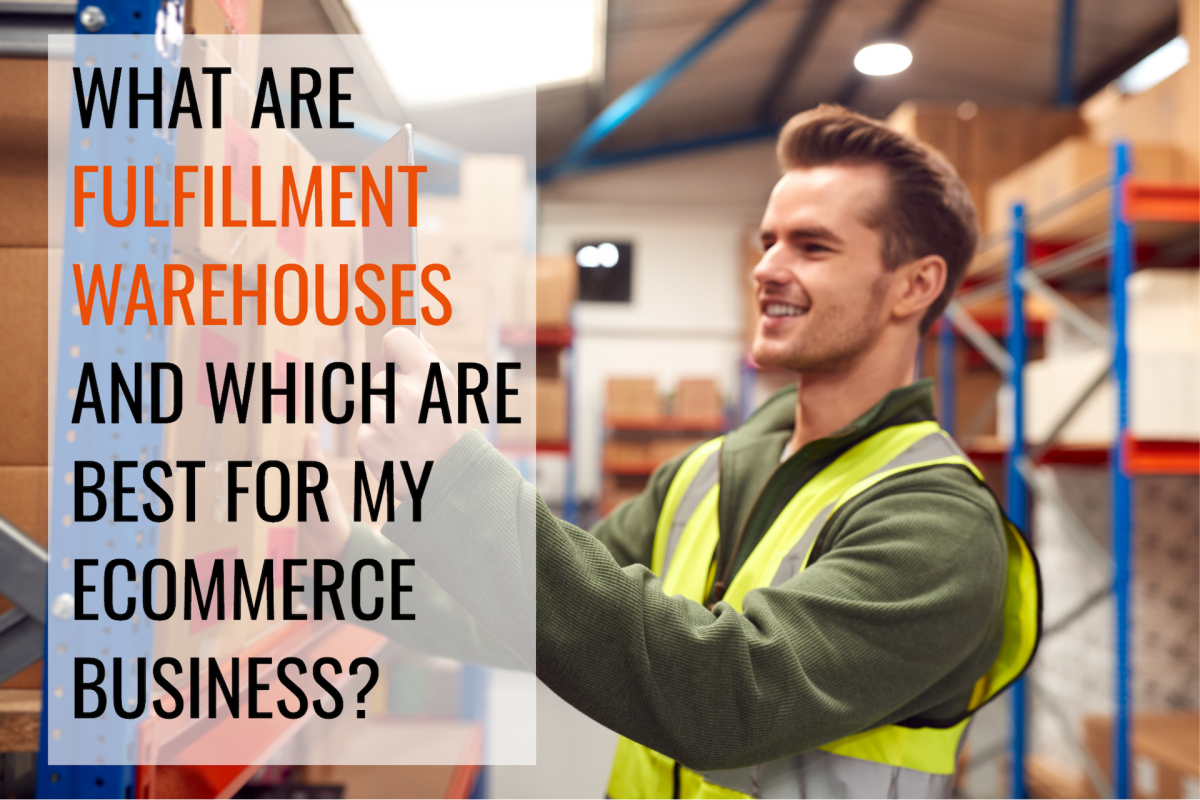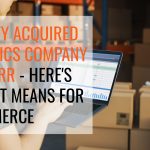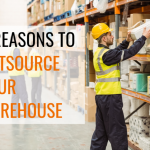When you’re just starting an ecommerce business, you can be hands-on with everything, including sourcing, social media marketing, customer service, and even order fulfillment – and that’s not a bad thing. This approach allows you to save on costs and at the same time lets you keep your finger on the pulse of your business.
But if you’re doing things right, there comes a point where you can’t possibly do everything yourself. One of the tasks that most ecommerce businesses outsource is warehouse and order fulfillment.
Little known fact about me. When I first got out of college, I worked in logistics. I spent about 10 years of my life working to help brands get products in and out of retail, and manage their fulfillment, so I have a little bit of knowledge in the space.
Shipping times matter a lot. Customers expect to receive their online orders fast and safely packed. If you or your staff are spending more than half of your time packing boxes and fulfilling orders instead of focusing on high ROI business processes, it might be time to consider fulfillment warehouses and fulfillment shipping.
There are a number of fulfillment centers out there, each with its own pros and cons, special services, and costs. How do you know if your small business is ready for outsourcing? And how do you know what kind of fulfillment warehouse will work best for your business? Let’s find out.
What Are Ecommerce Fulfillment Centers?
Fulfillment warehouses or fulfillment centers store your products and ship out orders to customers. Small business owners don’t have to worry about where and how to store their inventory as fulfillment centers provide physical warehouse space for the products. They also make sure that they’re stored in proper conditions.
When orders come in from clients, fulfillment centers pick, pack, and ship them out. It’s a brilliant solution for businesses looking to free up physical space and gain extra time. Saving time on your fulfillment and logistics will let you and your team focus on doing business processes that directly impact sales and conversions.
Thirty-nine percent of online stores get better reviews when they ship quickly and 59% say that adding a two-day shipping guarantee brings them repeat customers. Fulfillment shipping helps small businesses ensure a high quality of fast service that’s comparable to larger ecommerce companies. It also helps you scale in a calculated way because you know how much inventory you can keep and move out.
Fulfillment centers solve a lot of inventory management problems. Overselling is a common issue that you don’t want to happen too often. Stockouts can turn customers away and lead them to your competitors.
Shipping out the wrong products or improperly packaged items can also happen when you’re dealing with too many orders on your own, so entrusting these tasks to professionals is a way to ensure that the customer experience is always maintained at a high standard.
6 Order Fulfillment Services You Should Check Out
Here are some of the best fulfillment services you should consider:
Fulfillment by Amazon (FBA)
Fulfillment by Amazon (FBA) is the world’s biggest fulfillment center with more than 285 centers worldwide and thousands of employees. This vast network of warehouses and manpower means Amazon can deliver goods to customers as fast as possible, at affordable prices. This makes Amazon a natural first choice for many ecommerce retailers who don’t want to deal with the headache of logistics management.
Selling on Amazon and having your orders fulfilled by them also means you get access to the 153 million Amazon Prime members in the US plus another 50 million international Amazon Prime members. As an FBA seller, your products qualify for free shipping for Prime members. Amazon has a multichannel fulfillment portal that allows you to use the FBA service on orders that you receive on other channels like eBay, Etsy, or your own website.
FBA’s drawback is that it’s not a full-service fulfillment warehouse and you can’t customize your order packaging. Amazon also wants to reduce the length of time that products stay in their warehouses, so they’ve made fee changes that favor high sales turnover.
Fees are definitely something you have to look into before using FBA; in 2022, Amazon introduced some fee increases across many of its FBA services. Make sure to read their fee structure carefully to see if it’s the right fit for your products and business.
(Source: Amazon)
Shopify Fulfillment Network
Shopify Fulfillment Network is an e-commerce fulfillment solution for Shopify sellers. It was launched to help businesses on the Shopify platform streamline their operations. It’s great for businesses of all sizes as you can ship as few as ten orders up to thousands of orders per day.
Shopify suggests where your inventory should be stored in order to get it to your customers as fast as possible. Note that inventory storage is provided by Shopify’s 3PL network and not their own warehouses. These warehouses are located in the US and Canada and are vetted by Shopify.
Pricing is simple, predictable, and based on how much you sell. Shopify has value-added services such as handling returns, inspecting returned goods, repackaging undamaged ones, and inventory status updates for a flat rate. They offer free storage for the first six months. Contracts are flexible and you can opt out anytime.
Some of the top features are:
- Affordable two-day shipping
- Customizable packing slips
- Seamless inventory account management
- Delivery time badge displayed on product pages
(Source: Shopify)
Ship Hero Fulfillment
Ship Hero provides outsourced fulfillment that includes 7 warehouses distributed across North America and end-to-end shipping software that makes it easy for small businesses to manage their inventories. They ship out orders on the same day, from the warehouse that’s closest to your customer.
They also have a large client support team, ensuring that you and your customers can easily check in on order status. It’s a trusted company that serves more than 10% of Shopify stores worldwide. It’s easy to connect your storefronts with their software. Prices depend on the package size and shipping method (expedited shipping will cost more) and range from $5.60- $87.78 per product. Storage prices start at 65 cents per cubic foot.
Some of the top features are:
- Mobile-picking and in-package snapshots
- Real-time carrier rate shopping
- Bulk shipping options
- Transparent pricing
(Source: Ship Hero)
Get our GN- What Are Fulfillment Warehouses and Which Are Best for My Ecommerce Business - Worksheet delivered right to your inbox.
ShipBob
ShipBob is a fulfillment service that works with both B2C and B2B companies to ensure their products are shipped quickly and accurately. They’re an omnifulfillment solution, which means you can easily fulfill orders across different sales channels, including offline stores. They fulfill global orders from the US, UK, Europe, Canada, and Australia.
Prices are transparent and easy to understand, with no order minimums if you’re on the “Growth Plan”, a program designed for start-ups and small businesses shipping fewer than 400 orders per month. The monthly storage cost depends on the size of the bins or pallets you use and it costs 25 for ShipBob to receive your goods to the warehouse.
Other top features include:
- Affordable two-day delivery
- Delivery time badge on product pages
- Built-in reports and analytics to better understand your supply chain
(Source: ShipBob)
Red Stag Fulfillment
Red Stag Fulfillment is a cloud-based order fulfillment service for business to consumer (B2C) and business to business (B2B ) online retailers. They guarantee 100% inventory accuracy and same-day fulfillment of orders. They’re a great choice for online stores that sell large, heavy items that need special handling. The average parcel weight they handle is 20 pounds, but they also ship heavier than that.
There’s an average monthly minimum shipment of 200 orders, but you can still inquire about making other arrangements if you ship less. Many companies stick to a certain order-to-SKU ratio (number of orders you have versus your inventory), but Red Stag Fulfillment doesn’t do this.
The advantage of this is that you can stock more types of items or SKUs without having to meet the minimum requirement. Red Stag has a 30-day free trial. For more pricing information, fill out the pricing form page.
Other top features are:
- 2-day Dock-to-Stock where they’ll process your inventory within two days of arrival in their warehouses
- They offer international shipping, Amazon Prime, Shopify, and WooCommerce integration
- Kitting, light assembly, marketing inserts, and other value-adding services
- Compensation for errors or mistakes they make
(Source: Red Stag Fulfillment)
ShipMonk
ShipMonk is a fulfillment service with warehouses strategically located in the US, Canada, Mexico, the UK, and soon in Europe. With over 75+ integrations, you can easily connect your online store to ShipMonk software. ShipMonk invests in the latest warehouse automation technologies, which greatly reduce errors while increasing efficiency.
Their customer support team is available through call, chat, and email. Check out ShipMonk’s pricing calculator to estimate your fees and costs. Companies can also fill out a form to get a personalized quote.
Other great features include:
- Transparent billing and reports ensure you have no unexpected costs
- Provides services for ecommerce brands, crowdfunding projects, and subscription boxes
- Quicker and cheaper fulfillment costs
(Source: ShipMonk)
Falcon Fulfillment
Falcon Fulfillment specializes in high-volume orders for health, wellness, and beauty brands. Falcon Fulfillment can be integrated with your marketplace, and they stress eco-friendly packaging and kitting services for subscription boxes. You don’t need to worry about returns with Falcon Fulfillment as they manage that for you, and they can store your products in their expansive and secure warehouses.
Mention my name if you reach out to them and they will give you a special deal.
Other great features include:
- Quick turnaround, even for high volume orders
- A personal account manager that is focused solely on your brand, with supply chain management
- Customizable packaging offers
(Source: Falcon Fulfillment)
What Are Fulfillment Warehouse Management Fees?
The way that fulfillment warehouses normally structure their fees depends upon whether they are responsible for intaking your product from your suppliers and processing them, or whether you’re using their storage system (if they have a warehouse available).
Typically, you’re charged on a per-product basis, or a per-bin or per-slate basis if you are storing with your chosen fulfilment center. This is generally calculated by warehouse needs and services divided by your total annual shipments.
FAQs on Fulfillment Centers
Here are some commonly asked questions about ecommerce fulfillment centers:
Are fulfillment centers worth it?
Warehousing and fulfillment services offer many benefits such as seamless inventory management, affordable shipping costs, better delivery coordination, returns management, and customized packing. Outsourcing these labor and time-intensive activities improves your scalability and provides your customers with a better experience.
What are the disadvantages of fulfillment services?
Potentially higher costs, loss of inventory control, and lack of customization are disadvantages you might have to deal with if fulfillment is not the right fit for your business or if you don’t work with trusted warehousing and fulfillment companies.
The Next Steps: Choosing the Right Fulfillment Center
If you think your business is ready to work with a fulfillment center, here are the next steps to make sure you work with the right one:
Step One: Look Into Fee Structures and Contract Flexibility
Fulfillment services often have different fee structures. Some charge per-order and storage fees, flat-rate fees for extra services they offer, and some may have onboarding fees. Keep in mind that many fulfillment centers also offer discounted shipping rates for those who ship large volumes.
Look at your historical data and your projected sales and come up with monthly averages of how much inventory you want to keep and expect to sell, and use this as a basis for selecting the best price plan. You should also look for a partner that doesn’t tie you into long-term contracts that you can’t get out of in case you’re not happy with their service.
Step Two: Consider Warehouse Locations and Integrations
Choose a service that has warehouses or facilities that are located near your most common delivery areas to ensure cheaper, faster shipping and happier customers. Make sure that the service you select is compatible with the sales channels that you’re on. You might only be selling on one or two platforms now, but in the future, you might want to expand to other sales channels and it will be more convenient if your fulfillment provider also covers those.
While you’re in the expansion phase of your ecommerce business, it’s important to invest in the right partners that can help your business scale efficiently. Finding the best fulfillment partner to meet your goals is one of the most important business decisions you have to make- not just for your business, but for your customers as well.
If you need help finding marketing strategies to scale your business, reach out today for a free 20-minute consultation. Let’s look at solutions that will take your ecommerce business to the next level.
Get our GN- What Are Fulfillment Warehouses and Which Are Best for My Ecommerce Business - Worksheet delivered right to your inbox.







